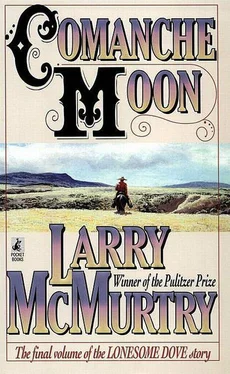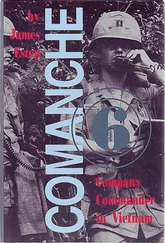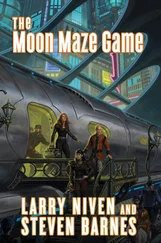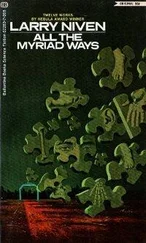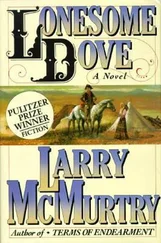"We must come back soon and catch those wild horses," he said to Buffalo Hump, as they were crossing the river, back into Texas.
"I have never known a man who wanted horses so much," Buffalo Hump said. Book III
Augustus McCrae was sitting at the bedside of his second wife, Nellie, when Woodrow Call tapped lightly on the door.
Bright sunlight poured through the window, but, to Gus's eye, the sunlight only pointed up the shabbiness of the two poor rooms where Nellie was having to die. There was no carpet on the floor, and the curtains were dusty; the windows faced on Austin's busiest street--horses and wagons were always throwing up dust.
"Come in," Augustus said. Call opened the door and stepped inside. The sick woman was pale as a bedsheet, as she had been for several weeks. He thought it could not be long before Nellie McCrae breathed her last.
Augustus, weary and confused, held one of the dying woman's hands.
"Well, what's the news, Woodrow?" he asked.
"War--civil war," Call said. "War between the North and the South. The Governor just found out." Augustus didn't answer. Nellie was in a war, too, at the moment, and was losing it. Thought of a larger war, one that could split the nation, seemed remote when set beside Nellie's ragged breathing.
"The Governor would like to see us, when you can spare a moment," Call said.
Augustus looked up at his friend. "I can't spare one right now, Woodrow--I'm helping Nellie die. I don't expect it will be much longer." "No--it's not likely to," Call agreed.
A bottle of whiskey and a glass with a swallow or two left in it sat on a little table by the bed, along with two vials of medicine and a wet rag that, now and then, Augustus used to wipe his wife's face.
"Captain Scull predicted this war years ago," Call said. "Do you remember that?" "Old Blinders--I expect he's already enlisted on the Yankee side," Gus said.
Once they had returned Captain Scull from captivity, his mind recovered, though not immediately.
For months he was still subject to bursts of hopping, which could seize him in the street or anywhere. He soon invented a kind of goggle, containing a thin sheet of darkened glass, to protect his lidless eyes from the sunlight. The goggles gained him the nickname "Blinders" Scull--he and Madame Scull were soon as intemperately married as ever, yelling curses at one another as they raced through town in an elegant buggy the Captain had ordered.
Then, overnight, they were gone, moved to Switzerland, where a renowned doctor attempted to make Scull usable eyelids, using the skin of a brown frog; rumour had it that the experiment failed, forcing the Captain to get by with his goggles from then on.
"Yes, I expect he's signed up," Call said. It was not likely that Inish Scull would sit out a war, eyelids or not.
Call put his hand on Gus's shoulder for a moment and prepared to leave, but Gus looked up and stopped him.
"Sit with me for a minute, Woodrow," he said, feeling sad. It was not much more than a year ago that his first wife, Geneva, had been carried off by a fever.
"You've no luck with wives, Gus," Call said. He sat back down and listened as the sick woman drew her shallow breaths.
"I don't, for a fact," Augustus said.
"Geneva barely lasted four months and it's not yet been a year since Nellie and I wed." He was quiet for a bit, looking out the window.
"I guess it's a good thing Clara turned me down," he said. "If we'd married, I fear she would have died off years ago." Call was surprised that Gus would bring up Clara, with Nellie dying scarcely a yard away. But the sick woman didn't react--she seemed to hear little of what was said.
Neither of the two women Gus had married had been able to survive a year. Call knew it had discouraged his friend profoundly. Unable to secure a healthy wife, he had already gone back to the whores.
"I wish Nell could go on and go," Gus said.
"She ain't going to get well." "I would prefer to be shot, myself, if I get that sick," Call said. "Once there's no avoiding death I see no point in lingering." Augustus smiled at the comment, and poured himself a little more whiskey.
"We're all just lingering, Woodrow," he said.
"None of us can avoid dying--though old Scull did the best job of it of any man I know, while that old bandit had him." "Do you have an opinion about the war?" Call asked. "One I could take to Governor Clark?" The hubbub in the streets had already grown louder. Soon the citizens of Austin, some of whom sided with the Yankees and more of whom sided with the South, might decide to begin a war at the local level, in which case there would soon be more people dying than Gus McCrae's wife.
"No opinion--andthe Governor has no right to press me, at a time like this," Augustus said.
"He just wants to know if we'll stay," Call told him. In the last few years he and Augustus had been the twin mainstays of frontier defense. Naturally a governor wouldn't want to lose his two most experienced captains, not at a time when most of the fighting men in the state would be going off to fight in the great civil war.
"I don't know yet--y vote for me, Woodrow," Augustus said. "Once Nellie dies I'm going to want to go drinking. When Nellie's buried and I'm fully sober again, I'll get around to thinking about this war." Call smiled at the comment.
"I've known you a good many years and I've rarely seen you fully sober," he remarked.
"I wouldn't be surprised if this war is fought and finished before that happens.
"The whole nation might kill itself before you're fully sober," he added.
He smiled when he said it, and Gus returned a weary glance.
"You go on and manage the Governor, Woodrow," he said. "I've got to manage Nellie." Hearing gunfire in the street, Call hurried out, to discover that it was only a few rowdies shooting off their guns. They wanted to celebrate the fact that, at long last, war had come.
Call made slow progress up the street.
Every man he saw wanted his opinion about the war; but the sight of Gus and his Nellie, in the poor cheap bedroom, left him feeling melancholy--it was hard to deal with the war question because he couldn't get his mind off Gus and Nellie. He had not known Nellie well--Gus had married her on only a week's acquaintance, but she seemed to be a decent young woman who had done her best to settle Augustus down and make him comfortable with the little they had. The only thing he knew about Nellie McCrae was that she was from Georgia; the only fondness he had ever heard her express was for mint tea. Now Lee Hitch and Stove Jones came crowding up with war questions, when all Call could think about was the sadness Gus must feel at having married twice, only to lose both wives.
"When are you leaving to fight the Yankees, Captain?" Stove Jones asked--it was only at that moment, when he saw Lee Hitch draw back in shock, that Stove realized he and Lee might favor different sides. It dawned on him too late that Lee Hitch hailed from Pennsylvania, a Yankee state, as well as he could remember.
Call didn't have to answer. Lee and Stove were looking at one another in astonishment. The two old friends agreed about almost everything; it had not occurred to either of them that they might be divided on the issue of the war that had just begun.
"Why, are you a Reb, Stove?" Lee asked, in puzzlement.
"I'm a Carolina boy," Stove reminded him; but his appetite for discussion of the coming conflict had suddenly diminished.
"We've still got the Comanches to fight, here in Texas," Call reminded them. "I suppose they're Yankees enough for me." "But everybody's going to war, Captain--t's the talk, up and down the street," Stove Jones said. "There'll be some grand battles before this is settled." "Some grand battles and some grand dying," Augustus said. He had come quietly up to where Call and the two men were talking. His arrival, so soon, took Call by surprise, though Augustus did not seem quite as sad as he had been in the rooming house.
Читать дальше
